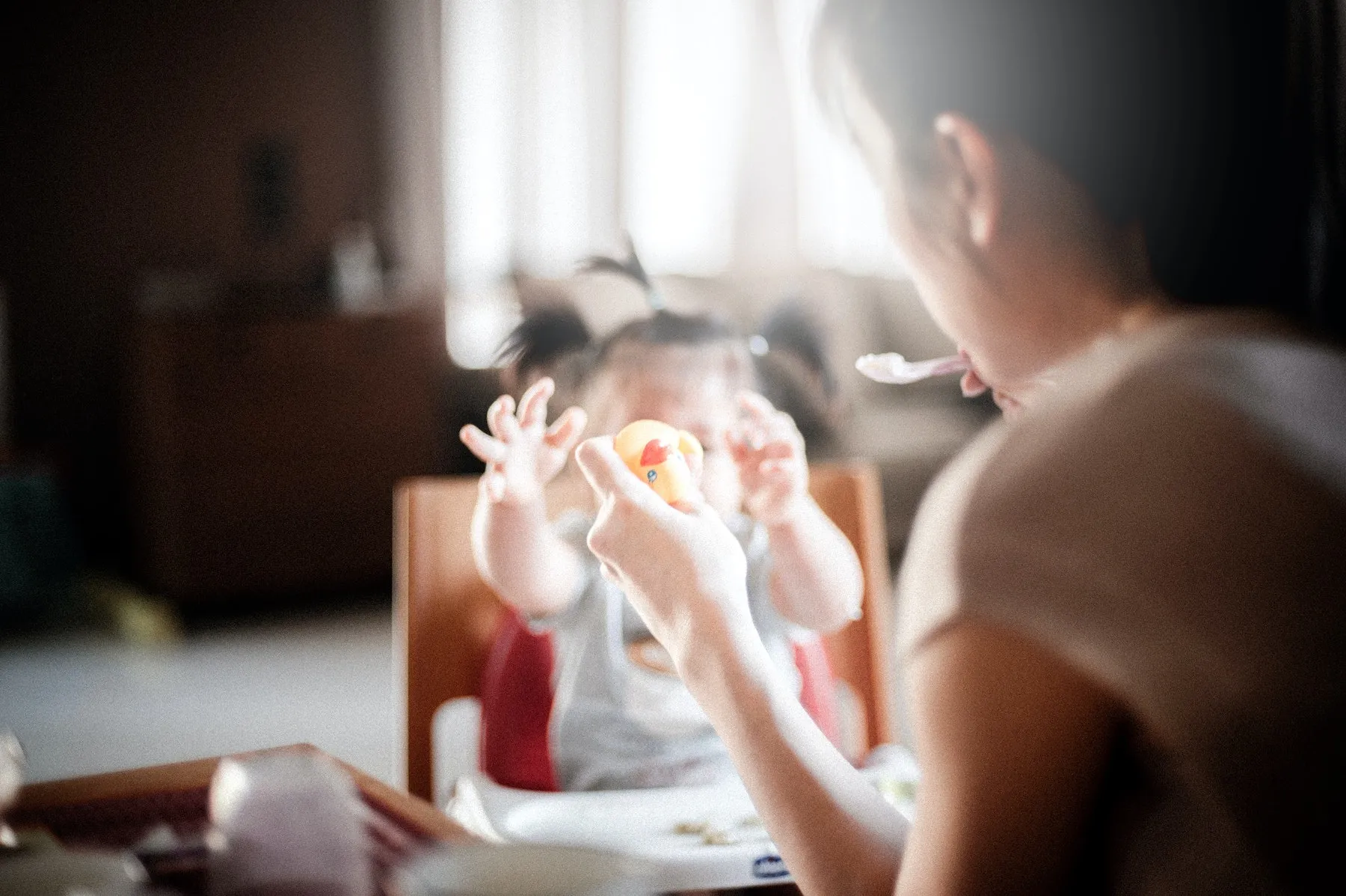


As a dad and as someone who has always loved efficiency, I am constantly looking for ways to cut down on the chaos and clutter of our life with three kids.
It’s definitely not easy to go from man-to-man coverage to a zone defense, but my wife and I are doing the best we can with an eight- , five- , and two-year-old. From bedtime routines to “simply” (big emphasis on the “ ”) getting in the car to go to the grocery store, life can feel a bit like a circus at times.
But things seem to hit a new level last year as we were getting my oldest ready for first grade. Between book reading, homework checks, filling cereal bowls, filling cups of milk, checking clothing for matching (or holes), making sure teeth were brushed, and hair was combed—most mornings were fairly chaotic.
Yet as I listened and interacted with my oldest, I kept noticing that he and I would always go through the same song and dance in the mornings about if he was ready for school. Each time I’d ask him the same questions to see if everything was done.
Then one day it dawned on me. This kid can read now! (Game-changer, am I right?!) So why go through the chaos and frustration of repeating myself every morning? So let’s turn this into a teachable moment for him and empower my son to do his own checklist in the morning (and we’re all working smarter, not harder).
So I sat down with him and we created his “Morning Checklist.”
It’s a simple list, really, that just asks him a few questions to make sure he is all squared away with what he needs to have done and be ready for a great day at school. Ours goes like this:
- Breakfast
- Get dressed
- Put shoes on
- Brush teeth
- Get mask
- Is backpack ready?
- Time to go!
That’s it! Just seven little checks to help him make sure he is ready to go. And let me tell you, that little paper has made a world of difference in our mornings (and our oldest son).
If you’re struggling with the pace and chaos of the morning, creating this little list can make a big impact on you and your child’s morning.
So let me encourage you to take a few moments, sit down with your kids, and write out a checklist for their morning routine.
Now, not only do my wife and I have a few less things to manage in the morning, but our son has really enjoyed a new ownership and pride from knowing he is able to get himself ready.
Looking back, he was probably ready to do this before my wife and I were. All we had to do was to stop “overdoing” for him and give him space to rise to the challenge.
With our middle child about to start kindergarten, my wife and I are looking forward to the calm that this simple checklist will provide our family in our morning routines. But I think our favorite part will always be the sense of confidence our kids are learning knowing they are capable.
By Mark Drury
Published on Thursday, August 18, 2022 @ 11:31 AM EDT



In the next few weeks, most kids and teenagers will have returned to school. The beginning of any school year often generates feelings of nervousness, excitement, and the anticipation of what’s to come – for our kids and for us.
Let’s face it, we were really hoping that in this school year, we’d be basking in the past-pandemic glow. The beginning of the 2021-2022 school year is certainly unique, but not necessarily in the way we were hoping for. This academic year is the marker for most of our kids to return to full time, in-person learning. On top of the normal jitters about the academic year, it’s no surprise to learn the pandemic is causing additional concerns for parents and students.
Here are the five top things many kids are worried about this school year and how to help address them.
Back to Virtual Learning
One of the biggest worries children have is the possibility of returning to a virtual learning setting. Further complicating matters is this pesky and dangerous Delta variant. With this variant on the rise, parents and kids face realistic concerns about school districts once again shutting their doors. While not going to school may have at one point seemed like a dream come true, many students (particularly teens) have grown tired of the isolation, limited peer connections, and the myriad of challenges that come with a homeschool environment.
Anxiety tends to look different for kids than it does for adults. For younger kids, you might observe “typical” stress behaviors such as avoidance, irritability, anger, or impatience. However, you may also hear your kid or teen mention somatic complaints such as headaches, stomach pain, or muscle soreness.
While no one, including school districts, can predict the direction or outcome of the Delta variant, all parents want to ease their children’s fears. But how can we do this when the situation is so unpredictable? Some of the best ways are to assure them that their feelings are completely valid and being open about your own anxieties or worries. Your child will feel better knowing they aren’t alone in their fears.
The Fear of Large Groups
Many fear the spread and uncertainty of the Delta variant, especially for our kiddos under the age of twelve who can’t receive the vaccine. With more minors becoming sick, it’s no surprise that there’s a lot of anxiety about returning to school.
In the past year and a half, many students have spent most of their time with their immediate families. Now, students will be around their peers and teachers again. Transitioning from isolation to socializing in larger groups may be concerning to our kids.
To help your children with this, remind them they will never be pushed into participating in a school activity they don’t feel comfortable with. It will be a slow process to return to the new normal, so letting them go at their own pace will help ease their anxiety in large groups of people.
Worries Over Academics
It has been a challenge for many students to transition from in-person learning to virtual and back. One of the biggest concerns many of my clients currently have is how these changes will affect their unique learning styles. Repeatedly adapting to new ways of learning will likely cause many students to feel confused about what works best for them; especially for students who did well on their own at home.
If your kid or teen is expressing these specific worries, ask them to reflect on what they think will help calm their academic fears. If they can’t come up with anything, offer some suggestions: Reviewing the syllabus or agenda each day? Talking to another friend in the class? Emailing the teacher ahead of time to clarify expectations?
If at all possible, encourage your child to get familiar with everything! This includes the syllabus, calendar, class expectations…and even the school building. If your child is transitioning to a new building, schedule some time to tour the new building or participate in any student orientations. When we know what to expect, we feel less stressed.
Maintaining and Building Friendships
Perhaps the biggest setback students faced in the past year was the impact on their social circles. At a crucial time in their developing lives, kids were separated from their friends. While they may have communicated via social media, FaceTime, or texting, it wasn’t the same as being together. Now that they’re back in school, it’s common for them to worry about the social skills they didn’t develop over the past year. This may be especially true for children who are more introverted, and who may struggle to effectively communicate with their peers.
If your younger child is worried about making friends, ask them to draw out their fears on paper or act them out with their dolls or puppets. Role play with them a scenario where you can teach them how to respond in an anxiety-producing social situation.
Older kids may be willing to verbally share their anxieties or write them out in a journal. Both processes allow for the creative expression of worries. Regardless of age, you can support your child by reminding them that they successfully adjusted socially once before and they can do it again.
How To Keep Themselves and Their Families Safe
One of the top concerns students have is how they can keep themselves and their families safe from the virus. Many have concerns over how many times they should wash their hands, for instance. Older kids or teens may worry about being too close to other students or teachers, or not knowing their vaccination status.
As tempting as it is, avoid minimizing their fears by debating their points, or insisting that “Everything is going to be ok.” This could shut down the conversation, when what we really want as parents is more dialogue with our children.
Instead, teach your kid or teens active coping skills. One such skill is helping your child to brainstorm different ways of managing their fears: Taking a 20-min walk? Listening to music? Taking deep breaths? One helpful question to pose is this: “If you came to an adult with one of your biggest worries, how would you want mom, dad, or a favorite teacher to respond?”
Another strategy is to remind them of a time they overcame a big challenge or a time they experienced fear but did the scary thing anyway. This helps build courage and emotional resilience.
If your child or teen is struggling to return to school, there is hope. Reach out to their teacher or school counselor to provide occasional check-ins. School counselors may be able to offer your child some helpful tools to ease their school-based anxieties.
If your student continues to struggle, even after school staff intervention, consider finding a private therapist who specializes in youth mental health and anxiety.
By Dr. Chinwé Williams
Published on Friday, August 12, 2022 @ 6:52 AM EDT

Asking for Help Doesn’t Make You a Bad Parent (It Makes You a Better One)



“It takes a village!”
You’ve said it. Or you’ve heard it. But have you ever lived it?
Back in the day—like, way back—families in our country lived within the wide-cast net of community. Work, play, faith, and life existed in the context of togetherness.
Somewhere along the way (around the 1950s), the idea of the nuclear family emerged. Parents embraced their roles in the family equation and lines were drawn and expectations were issued.
Men: earned
Women: cared for the home and children
As you well know, life has changed significantly from the 1950s. Inflation has soared, responsibilities have grown, and the demand to produce has created a situation where men and women are now shouldering far more than ever.
The traditional gender roles don’t work anymore. (They didn’t really work then, but that’s another post.)
We need help.
I was talking to a girlfriend today who told me, “I’m thinking about having my kids go to the after-school daycare two days a week so I can start exercising regularly.”
My response? “Oh, that’s a great idea.”
She was shocked. “Really? What do you think people will say?”
I understood her hesitancy. Aided by the highlight reels of social media, culture has convinced us that we should be able to do it all. Have a side hustle, be a #girlboss, ride our exercise bike daily, buy matching Christmas outfits for the kids, keep our kitchens Insta-worthy, and have regular date nights with our partners.
There’s been some recent pushback against these types of pressures, and cognitively, we know the pressures are unrealistic. But there’s still this pervasive disappointment we wrestle with when we can’t check every box at the end of the day.
(As an Enneagram 3, I’ll be the first to tell you, I’ve lost plenty of sleep over the unchecked boxes.)
I wonder what might happen if we embraced our inability to be all things to all people.
If we called a “truce” with life and admitted that we just can’t do it all.
If we acknowledge, with our actions and invitation for support, that we need help.
If we really raised our children in a village.
We aren’t wired to do life alone. Why would parenting be any different?
As a single parent, I maybe have a unique understanding of this principle because I have no other choice. It’s either ask for help or cease to function. I’ve learned that asking for help does two important things:
It gives other people the opportunity to build relationships with my kids. As much as I’d like to be at the center of their every memory . . . that’s kinda weird. Kids need other voices (especially the voices of other trusted adults) speaking into their lives to give them a sense of community and belonging.
It gives other people permission to ask for help too. I bet if we checked, we’d find that we’re all gripping white flags behind our backs. I say we raise those flags together as high as we can. That we look for the white flags of others and ask how we can help.
Asking for help doesn’t make you a bad parent. It makes you a human.
By Holly Crawshaw
Published on Thursday, July 28, 2022 @ 1:03 PM EDT



Have you ever wondered why innocence is so often associated with childhood? I believe it is because it is only through the eyes of a child (or a child-like imagination) that we see how playful life can be. When you are a child, you tend to see the good in everything. You feel protected by your parents and teachers from any danger that may come to you. Some correlate innocence with naiveté. But, if you really think about it, innocence is a strength—a tool of protection for a child who in many ways is helpless to manage the unpredictability and complications of this life. However, being a teenager is when things start to get much more complicated. Your teen may experience heartbreak, stress, academic and social pressures and begin to realize that the world is not so fair. With life’s inevitable ups and downs may come feelings of skepticism, distress or despair. As a parent, you have the opportunity to teach your child emotional resilience. Emotional resilience is one’s ability to adapt to or “bounce back” from a stressful situation or crises with confidence. These skills will educate your child on how to emotionally cope when life presents them with negative or disappointing situations. You will feel reassured knowing your child no longer needs to come to you for every solvable issue. They can take care of themselves and use these lessons as they mature into adults. Here are five ways you can cultivate emotional resilience in your kid or teen.
Emotional Awareness and Regulation
Emotional resilience is connected to emotional regulation. If your child has trouble expressing their feelings, they can become angry and if that anger or frustration is suppressed for too long, it can eventually lead your child to use drugs or alcohol or any number of things to cope. Instead of resorting to self-medication or other harmful ways to channel powerful emotions, kids and teens can learn how to be aware of their emotions and manage them appropriately.Life can be demanding and full of change and adversity, therefore it’s important that our kids and teens learn to embrace some degree of uncertainty without melting down or blaming others. One way to help your child with their emotional regulation is to teach them not to blame other people for their actions or emotions. Accountability and self-mastery are helpful skills to develop as they mature. They simply need to share how they feel about an experience and take full responsibility for whatever emotion is elicited. Although, no emotion is wrong, all emotions do not need to be acted upon. Reacting rather than responding to a powerful emotion can cause your kid or teen to do something they might regret later. Learning to think before acting is a sign of maturity and emotional resilience.
Focus on the Positive
Stress has a way of making your child focus on the negative. As school gets more demanding, your high schooler may begin to believe they will not graduate or get into a good college. They could think they will face too many struggles in the future that they cannot handle. Motivate your teen to develop a positive mindset when it seems like everything can go wrong. Teach your child positive affirmations such as “I can only get better” or “Just because I failed one thing today does not make me a failure.” You can help your child understand that failures and challenges are learning experiences. You can get better with each mistake you make as long as they are not repeated. Give your teen credit for putting themselves out there and trying.
Believing in Themselves
Your child may have the mindset that money and popularity are the only ways to achieve success. There are many definitions of success. Success and overcoming challenges for any child begins with believing that they can do anything they set their mind to with the right support along the way. You can inspire your child to believe in themselves by asking them three things they did well the past week and how they felt. This will give your child the recognition that they are winners every day they try. You can also ask them to list good things others have said about them. Share these positive acknowledgements with them often. They will eventually recall these kind words in any challenging situation they endeavor and any door they open.
Managing Perfectionism
Imperfection is synonymous to being human. However, many children and adults strive to be perfect despite plenty of evidence that shows that perfectionism causes psychological distress. Perfectionism can rob our children of their peace due to holding unnecessarily high and even unrealistic standards. Emotionally resilient kids have growth mindsets and understand that striving for excellence is a worthy goal. But striving for perfection is an impossible one. When our children make a mistake, they think that they are failing or not measuring up to a set standard. But we can teach our kids that life is about exploring, experiencing, and growing. I often share with the teens that I counsel that life becomes much more interesting once we abandon our urge for perfection and aim for excellence and imperfection instead. As caring adults, we play a part in breaking the cycle of perfectionism for our kids and teens. Here are some replacement thoughts or “affirmations” that can help your child to cope with perfectionistic thoughts:
- My worth isn’t based on my accomplishments.
- Not everything deserves 100% of my time and energy.
- It doesn’t have to be perfect to be powerful.
- Mistakes are an opportunity to learn and grow.
- I will give myself grace when I make a mistake.
And as much as possible, avoid using the word “perfect” entirely, even as a way to praise an achievement, such as earning an A+ on a difficult exam. This can cause children to believe that they MUST achieve at an incredibly high and perhaps unrealistic level. Instead, acknowledge the effort it took to earn that high grade. For example, you can say “Wow, I saw how hard you studied for that exam. I’m proud of you. How do you feel?” Asking for Help When Needed. Emotionally resilient individuals know to ask for help whenever they need it most. After all, no man is an island and no help means no positive changes. Your tween or teen may not want to come to you or another adult for help, thinking it is a sign of weakness. Let your child know they are using their strength when they ask for assistance—it is not a sign of weakness. Remind your teen of the positive outcomes that come from asking for help. Always give your child the impression that you are always available to listen to them whenever they have their struggles. An emotionally resilient child becomes a young adult who is in control of their feelings and can adapt to a positive outlook naturally.
By Dr. Chinwé Williams
Published on Thursday, July 21, 2022 @ 11:46 AM EDT



I grew up as a preacher’s kid.
My parents made a couple of things clear:
1. They wanted me to read the Bible.
2. They wanted me to memorize Scripture.
So they did what any sensible parents would do to develop those habits in me . . .
They paid me.
• They paid me every time I read through the Bible.
• They paid me every time I memorized a Bible verse.
• And they paid me every time I read a Christian book.
Yes, they did this even when I was a teenager and was desperate for gas money for my Volkswagen Jetta!
It must’ve been because they had so much money.
Nope. Look back at the first line: I grew up as a preacher’s kid!
My parents wanted me to know God better. They did things that a lot of parents do: they made me go to church, and they prayed with me before school in the morning. But ultimately, they understood that there were some tools I needed that were bigger than listening to someone pray or teach a lesson (although both of those are great).
Now that I’m a parent, I make no judgments on their decision. But for the sake of this blog, let’s talk about some other ways we can develop faith skills in our teenagers (Although, if you want to bribe them with cash and skip the rest of this post, be my guest!).
First, let’s be honest about a couple of things:
1. It’s difficult for us to develop and maintain these habits in our own lives. There are some of you reading this who’ve never ever missed a day of praying or reading your Bible in your entire life. That’s awesome!
For the rest of us, there are seasons where we’re killing it in this area, and seasons when we ride the struggle bus.
2. It’s a tough sell. I’ve spent A LOT of time working with teenagers. And trying to convince a teenage guy to pray to an invisible God or read a hard-to-understand book instead of video gaming, playing any sport, or simply napping . . .
Yeah, that’s NOT an easy sell. No, really. It’s not.
I tell you these things to take some pressure off of you thinking your teenager will become an overnight theologian. And also because I want you to eliminate the idea of thinking you can nag and pressure your teenager into becoming a highly-motivated pursuer of faith skills.
Now that we’ve covered those disclaimers, let’s dive into seven tips to help your teenager get off the sidelines and in the game when it comes to their faith skills:
1. Model It
Whether your child is 17 or 7, there’s going to be a greater chance of them stepping up and praying, reading their Bible, and worshipping when they see it as something you do (and actually enjoy!). Be honest with them about your own inconsistency in this area. But also let them know how it’s helped your life.
2. Give Them A Resource That Makes Sense To Them
This is the reason why I’ve written devotional journals like Know God and Live Free. It’s because I want teenagers to have a guide to acquiring faith skills in a way that makes sense to them.
As a teenager, I couldn’t sit down and read the Bible. I didn’t understand it. It didn’t make sense to me. It was boring, and I desperately wanted to fall asleep. When I actually did read the Bible, I didn’t remember any of it. Not a single word.
I’m not saying every teenager is like I was. I’m just saying that if you met me when I was 15, you would’ve said there’s no way this kid is ever going to develop any faith skills.
But I did.
As a 19-year old, I got a devotional journal at a Christian summer camp. For the first time in my life, I was guided in my personal time with God. It allowed me to actually stay focused, engaged, and connect with God. I loved it because I actually understood it! I am forever passionate about devotional journals as a way of getting teenagers engaged because that’s how I got started.
Related Resources: Live Free: A 5-Week Devotional Journal for Students and Know God: A 28- Day Devotional Experience for Students,
3. Partner with a Student Ministry
If a student pastor has introduced a plan for any type of faith skill development—and it’s something your teenager’s student ministry is currently doing—jump on board with that! Don’t encourage a competing plan.
Don’t guilt or put pressure on your student pastor if he or she doesn’t have a plan for this. But if they do, align your family with it. That’s the power of unified energy that comes when churches and families get on the same page!
4. Don’t Push Too Hard
Just encourage. If you’re a mom, your teenage son responds to your encouragement more than your pressure.
Sure, there are times you need to be “don’t-argue-with-me” strong. But save that for homework, respecting authority, and being nice to siblings. When it comes to faith skills, stay on the positive. Talk about benefits and encourage them to be recipients of them.
5. Encourage Honesty
If your teenager says, “I read the Bible, but it was so boring!” don’t freak out. Don’t react like, I CANNOT believe you said that about the holy Bible!! Like I said, I felt that way about the Bible as a teenage dude.
Relax. Let your teenager know that he or she can be honest with you about all things faith-related. That will encourage them to continue to be honest with you in the future.
I’ve been working with teenagers since 1998. They’re all unique. Which means they all have unique ways of worshipping, connecting with God through prayer, talking about their faith, etc. It’s part of their distinct wiring. To expect every teenager to get the same amount of energy and passion around knowing God the same way is simply ridiculous. No other relationship works that way. Faith skills shouldn’t, either.
6. Pray, Then Pray Again, Then Pray Some More
Again, this is the work of God through the power of the Holy Spirit to stretch your teenager son or daughter’s faith. It’s going to be His job, not yours.
• You should talk about it.
• You should model it.
• You should encourage it.
It’s just one of those things that HAS to be the work of God. And your best move is to continually put that before God as an urgent request.
7. Be Ready When They’re Ready to Talk
Every teenager is different. But most teenagers aren’t volunteering authentic information to their parents. You ask, “How was your day?” They say, “Fine.” There’s a reason why parents stalk their teenagers on social media: we want to know what’s going on in their lives!
But there will be rare, random moments when your teenager opens up. It may happen when you’re distracted or ready to go to bed. But those are the moments when you need to be ready.
So prepare ahead of time for those random moments. And when they happen, cherish them and engage with all your heart!
By Ben Crawshaw
Published on Thursday, July 14, 2022 @ 11:15 AM EDT


